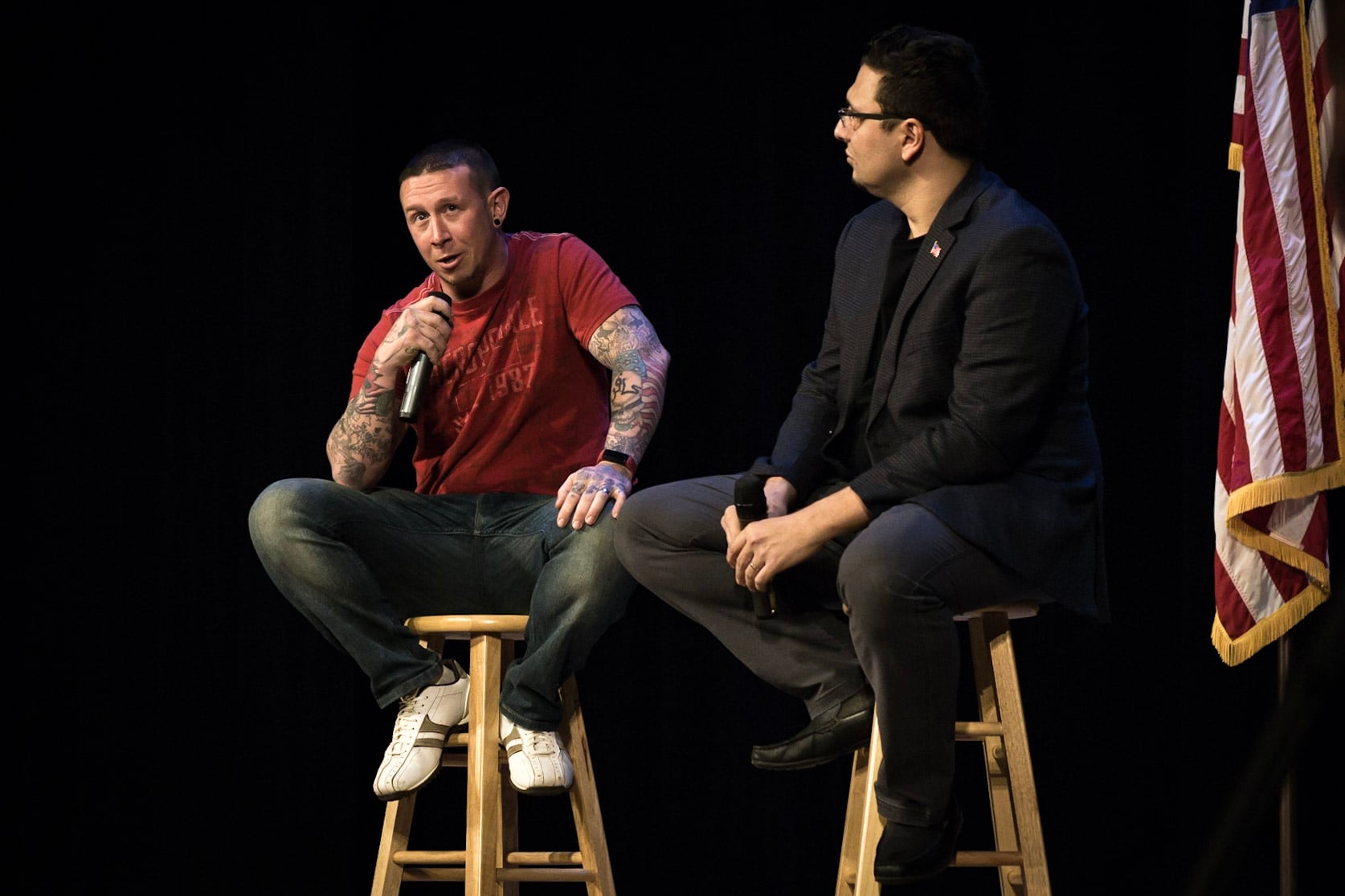‘Refuge’ documentary explores unlikely friendship between a Muslim refugee and former klansman

“Refuge” stars Christopher Buckley (left) and Dr. Heval Kelli (right).
Tomesha Faxio
Set in the most culturally diverse square mile in America, a new documentary, “Refuge,” shines a spotlight on the community of Clarkston, twenty minutes outside Atlanta. Filmmakers Erin Bernhardt and Din Blankenship first set out to show some of Clarkston’s unsung heroes, humble residents whose warmth and inclusivity served as a reminder of a prejudiced nation’s better angels. But an unexpected and extraordinary story of unlikely friendship and redemption unfolded before their camera’s eye. Bernhardt and Blankenship joined “City Lights” host Lois Reitzes via Zoom, along with one of the documentary’s subjects, a Syrian Kurd named Heval Kelli.
Interview highlights:
The evolving story and meaning of “Refuge”:
“When we started making this film, we were really focused on the community of Clarkston and had been following several individuals there, one of which is Heval,” said Blankenship. “Our other main character in Clarkston who you see in the film is Mama Amina, and she’s become this kind of mother to the community of Clarkston, and really takes care of and advocates for the people who live in Clarkston.”
“We wanted to show the counter-narrative to what had happened in Charlottesville, [Virginia], which, Din and I both went to the University of Virginia and so that’s why we’re both so passionate about that community. I think if we would’ve stayed doing that, it could have happened more quickly, but Heval ended up having something really extraordinary happened in his life,” said Bernhardt.
How Kelli created a connection with ex-KKK member Chris Buckley:
“I had never been to an area like where Chris was, and it was my first time meeting people from the rural counties in Georgia. But the only reason I wanted to go meet him, because at that time, there was a lot of misconception of our refugees and hatred toward refugees and immigrants, and I wanted to, instead of being part of the division, I wanted to be facing the other side,” said Kelli. “I wanted to face the extreme side where people really hate people like me and say, ‘Well, what can I do to understand the hatred toward someone like me who came to this country?’”
“I used to moonlight in the VA and help out in the emergency room, and I became much closer to the veteran community, so we had something in common to discuss. When I showed up at his house in Lafayette, Georgia, I just showed up like going to any Kurdish home. In our culture, when you show up at a Kurdish house, you bring gifts and food, and that’s what I did. I would just be in myself, showing up there, and we just started talking when we met for the first time offline,” Kelli said.
“Filming Chris and filming his evolution and transformation in real-time was, it’s so cliché, but like peeling an onion…. He’s really, really wise and really thoughtful. It was a little bit of a rollercoaster ride as he was going through his healing journey,” said Bernhardt. “It also puts a mirror in front of you. Din and I have talked with our whole time… about how we set out to help the country and the world understand how resilient refugees are… and what we ended up doing, by Heval forming this incredible relationship with Chris, is putting a mirror up in front of every single American, every single person in the world. We all have our own prejudices.”
Arno, the “extremism interventionist,” and other peacemakers in the film:
“He helps people to leave extremist groups and find ways to take the experience in a positive way and help others. And he was a driver for a lot of the work that Chris and I started doing, and how we met,” said Kelli. “Unfortunately, how the system works, you have to have a nonprofit and a proposal. And I feel like, in these times, we need more people like Arno. So finding ways to fund people like Arno is difficult…. He’s probably the reason for how many people left all these extremist groups.”
“We often say Melissa [Buckley] is the hero of the story,” said Blankenship. “I mean, Chris would not be where he is if it weren’t for her dedication to him, and her knowing the man that he is, and the man that he could be, and getting help.”
“Our impact partner Parents for Peace does exactly this work… where they are actively working with people who are in hate groups and trying to leave them, and hate groups across the spectrum – from Jihadists to white nationalists, to the far Left and everything in between. So Chris actually works for Parents for Peace now and is working with people who are trying to leave hate groups,” said Blankenship. “They’re also working at the policy level, helping people look systemically to help prevent and treat radicalism across the country.”
“Refuge” made its premiere at the Doc NYC Festival last weekend and is available to stream via virtual film festival passes on the movie’s website here.





